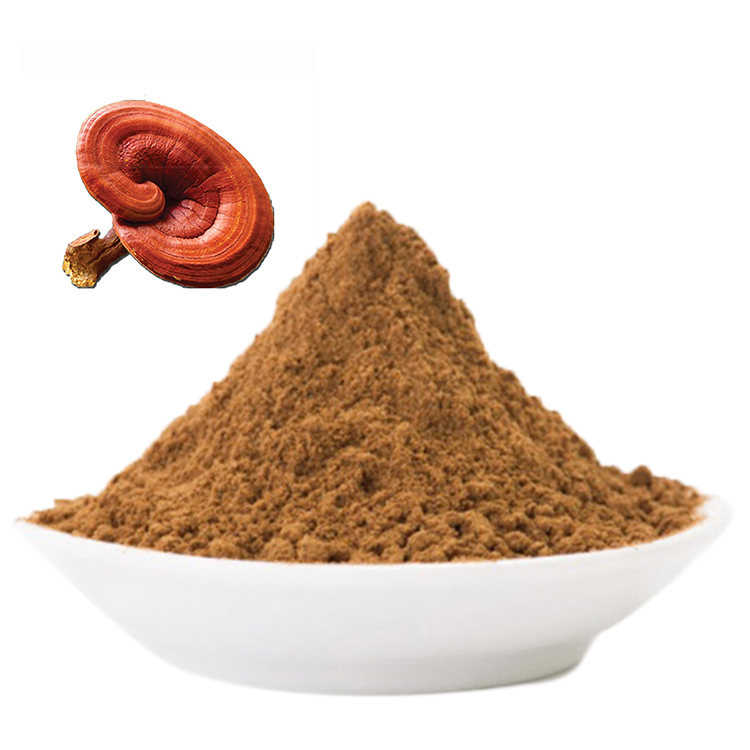Introduction
As the market for Reishi mushroom extract continues to expand, both brands and ingredient buyers face the challenge of ensuring that their products deliver real health benefits. Potency—the measure of bioactive compounds in the extract—determines the effectiveness and market value of every batch, from USDA Certified Ganoderma Powder to Organic Red Ganoderma Powder. This article explains how to evaluate the potency of Reishi mushroom extract for commercial use, covering key testing methods, critical metrics, and best practices for procurement and quality assurance.
1. Understanding Potency: Why It Matters for Reishi Extract
Definition of Potency
In the context of Reishi extract, potency refers to the concentration of health-promoting compounds—primarily polysaccharides and triterpenes.
Products like Organic Mushroom Extract Powder and Ganoderma Extract Powder are standardized to specific percentages of these actives (e.g., 30% polysaccharides, 2% triterpenes).
Potency directly influences dosage recommendations and the substantiation of functional claims.
Potency and Certification
Certifications such as USDA Certified Ganoderma Powder or EU Organic do not guarantee potency but do indicate a higher level of supply chain oversight and reduced risk of contamination.
Always check that claims about bioactive content are matched by corresponding third-party test results.
Potency as a Differentiator
In a competitive market, higher-potency grades (e.g., Organic Reishi Mushroom Powder with 40% polysaccharides) justify premium pricing and support strong wellness claims in finished products.
2. Key Potency Metrics for Reishi Mushroom Extract
Polysaccharide Content
Polysaccharides, especially beta-glucans, are linked to immune support and antioxidant effects.
Look for clear labeling (e.g., “≥30% polysaccharides by UV spectrophotometry”) and request lab results as proof.
Higher polysaccharide content is a hallmark of Organic Mushroom Extract Powder and USDA Certified Ganoderma Powder.
Triterpene Content
Triterpenes are associated with anti-inflammatory and liver-protective benefits.
Dual-extraction methods (using both water and alcohol) typically produce higher triterpene levels, which should be confirmed by HPLC (High-Performance Liquid Chromatography) or similar methods.
Ganoderma Extract Powder often emphasizes triterpene content in product specifications.
Purity and Concentration Ratios
Evaluate the extract’s purity (absence of carrier agents, fillers, or contaminants) and the raw material-to-extract ratio (e.g., 10:1 means 10kg mushroom yields 1kg extract).
Ratios are not substitutes for confirmed active content but provide useful context.
Additional Markers
Other markers may include beta-glucan percentage, ergosterol, or specific triterpenoid profiles for advanced buyers.
For Organic Red Ganoderma Powder, visual and sensory attributes may also be assessed for authenticity and consistency.
3. Potency Testing: Best Practices for Commercial Buyers
Third-Party Laboratory Testing
Always require a Certificate of Analysis (COA) from an independent lab for each batch. The COA should list polysaccharide and triterpene percentages and detail the methods used.
Look for recognized testing methods (HPLC, UV spectrophotometry, GC-MS) for accurate, reproducible results.
Batch-to-Batch Consistency
Request samples from multiple batches to assess consistency. Variability can signal poor manufacturing controls or adulteration.
Organic Reishi Mushroom Powder from reputable suppliers should show minimal batch variation in potency and purity.
Auditing and Supplier Verification
Audit suppliers regularly to verify their sourcing, processing, and testing practices. Confirm that certifications (like USDA Organic) are valid and up to date.
Reliable suppliers of Organic Mushroom Extract Powder and Organic Red Ganoderma Powder will proactively share documentation and welcome audits.
4. Factors Affecting Potency in Commercial Reishi Extract
Mushroom Strain and Cultivation
Different strains of Ganoderma lucidum yield varying levels of bioactives. Organic and wild-crafted sources may offer superior potency but can be less consistent.
Cultivation practices (substrate, environment, harvest timing) also influence bioactive content.
Extraction Method and Conditions
Hot water extraction is best for polysaccharides, while alcohol or dual extraction is required for triterpenes.
Extraction temperature, duration, and solvent type all affect yield and potency.
Storage and Handling
Improper storage can degrade actives. Potent products like USDA Certified Ganoderma Powder and Ganoderma Extract Powder should be stored in airtight, moisture-proof packaging and kept away from light and heat.
5. Using Potency Data for Product Development and Marketing
Formulation and Dosing
Use potency data to design effective serving sizes for supplements, beverages, or functional foods.
Consistent potency enables brands to make structure/function claims with confidence.
Marketing and Compliance
Transparent sharing of potency data (e.g., via QR codes or COA access) boosts consumer trust and satisfies regulatory requirements.
Higher-potency grades like Organic Reishi Mushroom Powder or Organic Red Ganoderma Powder can be positioned as premium or clinically supported products.
Ongoing Quality Control
Establish an ongoing testing protocol for finished goods, not just raw materials, to ensure end-to-end potency verification.
Conclusion
Evaluating the potency of Reishi mushroom extract is a critical step for any commercial buyer, ensuring product effectiveness, safety, and compliance. By demanding rigorous third-party testing, focusing on key metrics, and working with experienced, certified suppliers, brands can deliver high-quality products—whether USDA Certified Ganoderma Powder, Organic Mushroom Extract Powder, Organic Reishi Mushroom Powder, Ganoderma Extract Powder, or Organic Red Ganoderma Powder—that meet the highest standards of the modern wellness industry.
Key Product Keywords :
USDA Certified Ganoderma Powder, Organic Mushroom Extract Powder, Organic Reishi Mushroom Powder, Ganoderma Extract Powder, Organic Red Ganoderma Powder, Reishi Potency Testing, Ganoderma Quality Control, Mushroom Extract Analysis, Polysaccharide Content, Triterpene Standardization, Dual Extraction Reishi, Certificate of Analysis, Third-Party Lab Ganoderma, High-Potency Reishi, Premium Mushroom Powder, Functional Food Ingredient, Clean Label Extract, Batch Consistency, Herbal Supplement Testing, Supply Chain Verification.
Read More:
Real Consumer Feedback on Ganoderma Extract: Honest Reviews & Global Insights
Thirty Days on Ganoderma Extract: What Changed in My Body?
Precautions and Contraindications When Taking Ganoderma Extracts: A Comprehensive Guide
Hangzhou Molai Biotech Co., Ltd has supply capacity 1200+ tons per year for mushroom powders and extracts, including the mushroom mycelium from modern technology of Deeply Liquid Fermentation and fruiting bodies from the grown real mushrooms to meet the different markets.
Hangzhou Molai Biotech Co., Ltd supplies the products both in Powders and Extracts for commercial using worldwidely, such as Cordyceps Sinensis, Cordyceps Militaris, Maitake Mushroom, Lion’s Mane Mushroom, Turkey Tail Mushroom, Reishi Mushroom, Chaga Mushroom etc.
We offer OEM and ODM services, could extract the products according to your special requirements, process the powders/extracts into Capsules, Tablets, Small Bags, Mushroom Bars, Mushroom Coffee etc.
Organic Lion's Mane Mushroom Extract
Organic Reishi Mushroom Extract
Organic Cordyceps Militaris Extract
Organic Turkey Tail Mushroom Extract
Organic Chaga Mushroom Extract
Organic Shiitake Mushroom Extract
Organic Maitake Mushroom Extract
Organic Tremella Mushroom Extract






